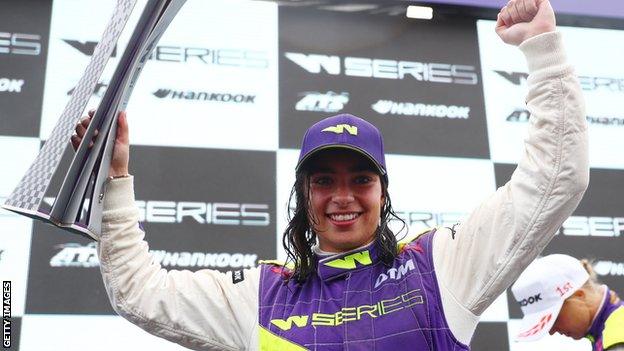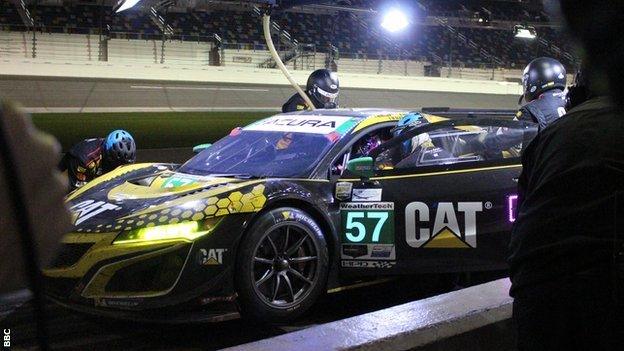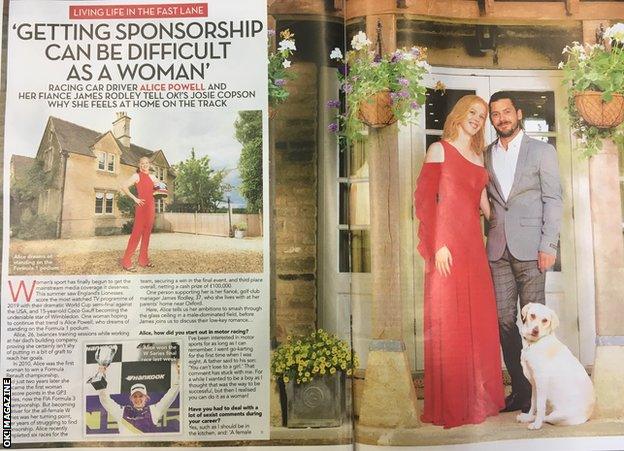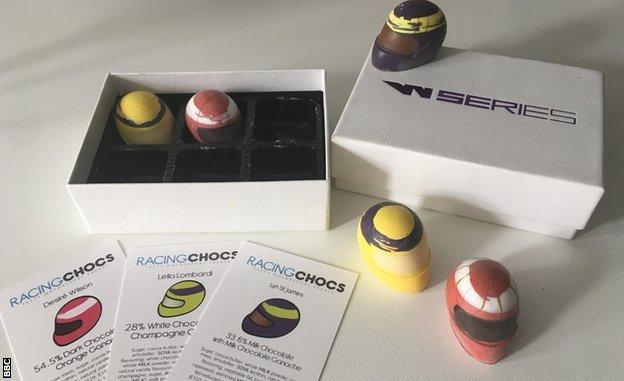W Series: Has it already made a difference as women bid for Formula 1?
- Published

Jamie Chadwick is the inaugural champion of the W Series and is now a development driver for the Williams Formula 1 team
'Rethink racing' - that's what the W Series asked us to do.
In six races over a four-month period, the female-only motorsport championship has generated significant interest in a male-dominated industry with the ultimate aim of getting women on the grids of top-level racing.
The series is designed to help women break through the 'glass ceiling' often experienced after junior karting, when drivers embark on the quest for sponsors to fund the next level of a career in motorsport - which can cost millions.
Originally criticised for segregating women from male competition, several of the 20 women who lined up on the W Series grid have been handed a chance they would not ordinarily have had.
Just a week after the series finale, a number of drivers have earned paid seats elsewhere.
Female, gifted and broke
When driver Alice Powell sought sponsorship, the response she often received was: "We're not sure that a woman in motor racing is the right positioning for us."
The first race of the series in Hockenheim, Germany, was Powell's first time behind the wheel in five years because of the struggle for backing.
Before the W Series came along, her dream of being a full-time racing driver appeared to be over and she worked as a labourer for the family firm, renovating properties.
Powell said: "Then W Series came along and changed the game. I had just been unblocking a urinal when I got the call."

Alice Powell will race for Katherine Legge's all-female American sportscar team, which competed at this year's Daytona 24 Hours
Following Powell's second place at Hockenheim, Powell took W Series CEO Catherine Bond Muir to one side. Bond Muir explained: "She hugged me and said 'thank you for making me feel like this again'."
Bond Muir, who has become known for her close relationship with all the drivers in the series, added: "Alice was the first woman in GP3 to get points and then her career stopped and there was nothing for her, and this has given her the opportunity to show the world what a great driver she is."
Two days after Powell won her first W Series race in the season finale at Brands Hatch, it was announced she will drive for Heinricher Racing in IMSA GT3, a top-level sportscar championship, alongside British driver Katherine Legge; racing in W Series certainly helped her cause.

Alice Powell has already featured in lifestyle magazine OK!
'It's been incredible'
Powell's is not the only success story. W Series champion Jamie Chadwick, who sealed the title at Brands Hatch, is backed by Aston Martin's junior driver programme, and won her class in the Nurburgring 24 hours race. She also signed for the Williams Formula 1 team as a development driver in May.
Chadwick told BBC Sport: "I was relatively unknown coming into this season and now I think the leg up the W Series has given me has been huge... I think as a first year of the series goes, it's been incredible what they've managed to achieve."
Spain's 19-year-old Marta Garcia, who was one of five different drivers to win a W Series race, said she was "relieved" to be on the grid 18 months after being short of money and dropped by Renault's driver academy in Spanish Formula 4 following just one season in the car.
Now, after finishing fourth overall, Garcia plans to invest her £82,500 prize money in the Toyota Racing Series in New Zealand.
Sabre Cook, an American engineer working for Infiniti and Renault in Formula 1, competed in the W Series to become one step closer to racing in the USA's biggest single-seater series, IndyCar. Italian driver Vicky Piria - who finished ninth in the W Series championship - was in touching distance of being an F1 test driver in 2013, aged 18, until it fell through.
What's holding women back in racing?
When W Series chairman Sean Wadsworth's children had a go-kart race, he told his 11-year-old daughter "you could be a racing driver". She replied: "There's no point." Wadsworth asked why and she responded: "Because women don't do that."
The W Series was Bond Muir's idea, born over drinks with some friends. After doing some research and finding that women can race equally in motorsport, Bond Muir initially felt a women-only category was "a completely dreadful idea because there's no need for it".
She told BBC Sport: "And then I did more research and found that in the previous eight years the number of women competing in single-seater series across the world was actually diminishing year on year. I thought 'actually, there does need to be this platform'."
In motorsport, it's no secret that drivers need huge sums of money to make it - around £7m to get from junior karting to Formula 1.
Don't you need a fireproof bra? What not to ask a W Series driver
Chadwick added: "Financial backing is the biggest hurdle and it's the same for everyone. If you look at all the drivers that have made it into F1 now, they have all come with significant backing whether that's personal or through sponsors or a team. None of them have paved the way by scraping the barrel.
"It's tough, it's the way the sport is, but hopefully this has put me in a position to make that happen."
Wadsworth highlighted the success of the US women's football team, saying: "Nike started investing in them 10-15 years ago and that allowed them to become professional sportswomen.
"The big difference between what we have here and what Lewis [Hamilton] can do, or the rich kids in Formula 2 [the feeder series into F1], is Alice Powell has to fit toilets with her dad at the weekend because she's not a professional athlete."
As well as providing 20 women with the opportunity to race, it has given them media exposure on a global level. The races have been broadcast to more than 300 million people in more than 70 countries.
Wadsworth added: "Fabienne Wohlwend has just given up her job, and I think there's three of four of them going to be resigning from their jobs because they can now be professional athletes."

Chocolates, before the performance? W Series' attention to detail has been praised
What happens next?
Many elements of the series have been distinctive and refreshing and it's all in the detail; from giving the top 10 drivers a share of the £1.2m prize pot to reinvest in racing, to the complimentary chocolates in the hospitality area which include helmet designs of past female F1 drivers.
"W Series has changed many perceptions since its launch, including my own," said motorsport journalist Luke Smith. "I was initially doubtful of the series' necessity, but it has quickly proved itself to be a massively positive force for women in motorsport.
"It is helping to shine a spotlight on female racers, as well as opening up more doors for them. Beyond that, its wider message looks set to help inspire the next generation of women in motorsport both on and off the race track."
The W Series may have been set up to help raise female participation, but it has also created a platform to solve one of motorsport's big challenges - the cost of competing, at least for women.
There are valuable superlicence points on offer next year for those with aspirations to compete at the top level. It is 43 years since a woman started an F1 race and the W Series has made the idea of a female driver racing at the pinnacle of motorsport more realistic.